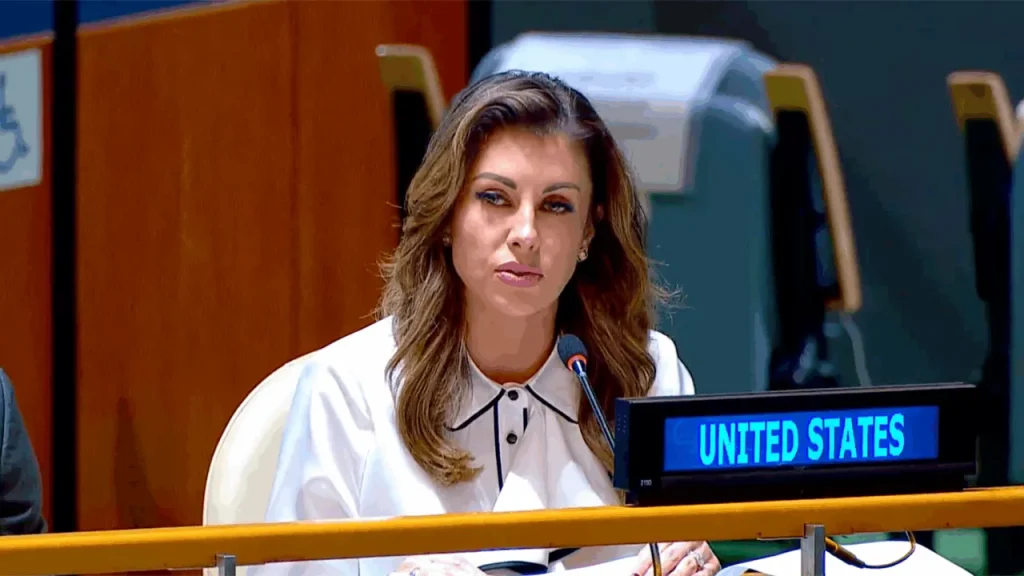The United Nations Vote on Palestinian Statehood: A Contentious Path Forward
The Trump administration took a firm stance against the Saudi and French-led initiative for Palestinian statehood at the United Nations on Friday, as the General Assembly approved the “New York Declaration” by a significant margin. With 142 nations voting in favor, the U.S. joined just nine other countries in opposition, while 12 nations abstained. This vote represents a pivotal moment in the ongoing dialogue about the Israeli-Palestinian conflict, particularly in the aftermath of the October 7 attacks and the subsequent war in Gaza. U.S. United Nations Counselor Morgan Ortagus didn’t mince words, calling the resolution “a gift to Hamas” and “an insult to the victims of Oct. 7.” The White House echoed this sentiment, with an official reiterating President Trump’s position that recognizing a Palestinian state would effectively reward Hamas and potentially hinder efforts to secure the release of hostages still held in Gaza. The administration maintains that such recognition would be counterproductive to the peace process and broader diplomatic efforts in the region, suggesting that symbolic political gestures may undermine practical progress toward stability.
The “New York Declaration,” initially proposed during a UN conference in July, aims to establish what its supporters describe as an “irreversible” pathway toward Palestinian statehood. While the declaration explicitly condemns Hamas for the October 7 attacks and calls for the release of all hostages, it also outlines specific requirements for Hamas to relinquish control of Gaza and surrender its weapons to the Palestinian Authority. These provisions reflect an attempt to balance the recognition of Palestinian national aspirations with security concerns that have long dominated the conversation around the Israeli-Palestinian conflict. The declaration represents an effort to create a roadmap that acknowledges both the Palestinian right to self-determination and Israel’s security needs, though critics argue it fails to adequately address the latter.
France’s Foreign Ministry celebrated the outcome as a “historic vote” that demonstrates international resolve to advance “an ambitious roadmap for peace and security for all in the region.” The French government views the declaration as embodying unprecedented support for principles including an immediate ceasefire, hostage release, and the creation of a viable, sovereign Palestinian state. President Emmanuel Macron plans to attend a follow-up conference in New York on September 22, signaling France’s commitment to this diplomatic path. This European leadership on the Palestinian statehood question marks a significant development in international approaches to the conflict, potentially creating tensions with traditional U.S. leadership in Middle East peace efforts. The French initiative, supported by Saudi Arabia and numerous other nations, suggests a growing willingness among international actors to pursue Palestinian statehood independent of U.S. policy preferences.
Israel’s response to the declaration was unequivocal, with UN Ambassador Danny Danon dismissing the vote as “theater” that benefits Hamas rather than advancing peace. This perspective is shared by Anne Bayefsky, director of the Touro Institute on Human Rights and the Holocaust, who characterized the declaration as “a direct threat to American national security” and “an unabashed attempt to destroy the Jewish state.” Bayefsky specifically raised concerns about provisions related to the Palestinian “right of return,” suggesting that an influx of Palestinians into Israel could undermine the Jewish majority and threaten Jewish self-determination. These criticisms highlight the deep divisions that continue to characterize discussions about Palestinian statehood, with Israeli concerns about security and national identity often clashing with Palestinian aspirations for sovereignty and justice.
The vote revealed interesting geopolitical alignments, with countries like Argentina, Hungary, Israel, Micronesia, Nauru, Palau, Papua New Guinea, Paraguay, and Tonga joining the United States in opposition. Perhaps more surprising was Germany’s support for the declaration, which Bayefsky called “absolutely shocking,” arguing that it undermined “the vital necessity of Jewish self-determination.” These voting patterns reflect complex international dynamics surrounding the Israeli-Palestinian conflict, with some traditional U.S. allies breaking ranks to support the statehood initiative. The relatively small number of countries opposing the resolution highlights the international isolation of the U.S. position, even as the administration continues to assert its leadership in “real-world efforts to end the fighting and to deliver a permanent peace.”
As the international community digests the implications of this vote, Secretary of State Marco Rubio announced plans to visit Israel ahead of high-level UN meetings later this month. These meetings could prove consequential, as countries including France and Britain are expected to formally recognize Palestinian statehood. The trajectory toward broader international recognition of a Palestinian state appears to be gaining momentum, despite U.S. opposition. This creates a challenging diplomatic landscape, where the Biden administration must navigate between its traditional support for Israel, pressure from international allies, humanitarian concerns in Gaza, and the complex realities of regional politics. The “New York Declaration” and its aftermath may ultimately represent a turning point in how the international community approaches Palestinian statehood, with potentially far-reaching consequences for Middle East peace efforts in the years ahead.















